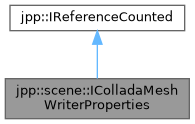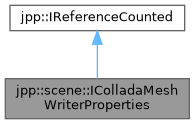 |
Jimcpp 2.1.0
Jimcpp is a high-performance c++ graphics engine.
|
 |
Jimcpp 2.1.0
Jimcpp is a high-performance c++ graphics engine.
|
Callback interface for properties which can be used to influence collada writing. More...
#include <jimcpp/core/engine/IColladaMeshWriter.hpp>


Public Member Functions | |
| virtual E_COLLADA_TECHNIQUE_FX | getTechniqueFx (const video::SMaterial &material) const =0 |
| Which lighting model should be used in the technique (FX) section when exporting effects (materials) | |
| virtual s32 | getTextureIdx (const video::SMaterial &material, E_COLLADA_COLOR_SAMPLER cs) const =0 |
| Which texture index should be used when writing the texture of the given sampler color. | |
| virtual E_COLLADA_JPP_COLOR | getColorMapping (const video::SMaterial &material, E_COLLADA_COLOR_SAMPLER cs) const =0 |
| Return which color from Jimcpp should be used for the color requested by collada. | |
| virtual video::SColor | getCustomColor (const video::SMaterial &material, E_COLLADA_COLOR_SAMPLER cs) const =0 |
| Return custom colors for certain color types requested by collada. | |
| virtual E_COLLADA_TRANSPARENT_FX | getTransparentFx (const video::SMaterial &material) const =0 |
| Return the transparence color interpretation. | |
| virtual f32 | getTransparency (const video::SMaterial &material) const =0 |
| Transparency value for that material. | |
| virtual f32 | getReflectivity (const video::SMaterial &material) const =0 |
| Reflectivity value for that material. | |
| virtual f32 | getIndexOfRefraction (const video::SMaterial &material) const =0 |
| Return index of refraction for that material. | |
| virtual bool | isExportable (const jpp::scene::ISceneNode *node) const =0 |
| virtual IMesh * | getMesh (jpp::scene::ISceneNode *node)=0 |
| virtual bool | useNodeMaterial (const scene::ISceneNode *node) const =0 |
| Return if the node has it's own material overwriting the mesh-materials. | |
 Public Member Functions inherited from jpp::IReferenceCounted Public Member Functions inherited from jpp::IReferenceCounted | |
| IReferenceCounted () | |
| Constructor. | |
| virtual | ~IReferenceCounted () |
| Destructor. | |
| void | grab () const |
| Grabs the object. Increments the reference counter by one. | |
| bool | drop () const |
| Drops the object. Decrements the reference counter by one. | |
| s32 | getReferenceCount () const |
| Get the reference count. | |
| const c8 * | getDebugName () const |
| Returns the debug name of the object. | |
Additional Inherited Members | |
 Protected Member Functions inherited from jpp::IReferenceCounted Protected Member Functions inherited from jpp::IReferenceCounted | |
| void | setDebugName (const c8 *newName) |
| Sets the debug name of the object. | |
Callback interface for properties which can be used to influence collada writing.
|
pure virtual |
Return which color from Jimcpp should be used for the color requested by collada.
Note that collada allows exporting either texture or color, not both. So color mapping is only checked if we have no valid texture already. By default we try to return best fits when possible. For example ECCS_DIFFUSE is mapped to ECIC_DIFFUSE. When ECIC_CUSTOM is returned then the result of getCustomColor will be used.
|
pure virtual |
Return custom colors for certain color types requested by collada.
Only used when getColorMapping returns ECIC_CUSTOM for the same parameters.
|
pure virtual |
Return index of refraction for that material.
By default we don't write that.
|
pure virtual |
Return the mesh for the given node. If it has no mesh or shouldn't export it's mesh you can return 0 in which case only the transformation matrix of the node will be used.
|
pure virtual |
Reflectivity value for that material.
The amount of perfect mirror reflection to be added to the reflected light
|
pure virtual |
Which texture index should be used when writing the texture of the given sampler color.
|
pure virtual |
Transparency value for that material.
This value is additional to transparent settings, if both are set they will be multiplicated.
|
pure virtual |
Return the transparence color interpretation.
Not this is only about ECCS_TRANSPARENT and does not affect getTransparency.
|
pure virtual |
Should node be used in scene export? (only needed for scene-writing, ignored in mesh-writing) By default all visible nodes are exported.
|
pure virtual |
Return if the node has it's own material overwriting the mesh-materials.
Usually true except for mesh-nodes which have isReadOnlyMaterials set. This is mostly important for naming (as ISceneNode::getMaterial() already returns the correct material). You have to override it when exporting custom scenenodes with own materials.